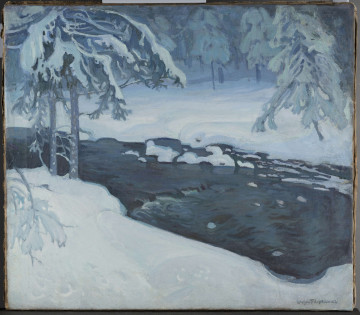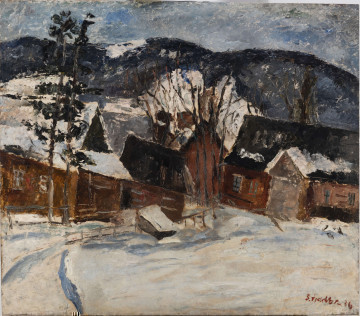
A winter fairy tale
1920
National Museum in Lublin
Part of the collection: Landscape
The painting is one of the realisations of the winter landscape, a complex subject with which Józef Czajkowski repeatedly struggled. At different times this challenge was also taken up by other Polish landscape painters. Masters such as Józef Chełmoński, Julian Fałat, Ferdynand Ruszczyc, Jan Stanisławski, Leon Wyczółkowski, Stanisław Witkiewicz and Michał Wywiórski created canonical ‘winter’ masterpieces.
Pejzaż zimowy [Winter Landscape] painted by Czajkowski in 1907, like his other works, for example, Sad w zimie [Orchard in Winter] (1900), undoubtedly belongs to the best representations of this type. The painting echoes the work of Stanislavsky, with whom the painter was fascinated. He informally drew on the teachings of his master, taking part in plein-air expeditions to the areas around Kraków and Zakopane. One can also find inspiration in the art of James McNeill Whistler or Olga Boznańska, who was very close to the painter.
What draws the viewer's attention is, above all, a very unusual composition. The framing used by the author gives the impression that the painting has been cut out of a larger, full view. The main element of the representation is a snow-covered avenue shown in linear perspective, leading to a stone gate. On both sides of the road, by the side edges of the painting, there are rows of trees, fragments of trunks, as the upper line of the composition ‘cuts’ them more or less in half. Brownish-grey, rhythmically arranged elements with sharp contours strongly contrast with the white plane of snow, which occupies most of the picture's field. The snow cover has been reproduced using various shades of a single colour with a predominance of muted blues that form bands of long shadows cast by the trees. The use of such a very sparing although sophisticated range of colours, limited to black, white and cool blue, gives a highly decorative, almost graphic effect.
In addition to painting, the author was also a successful graphic artist in other fields of art. He was, among other things, a designer, propagating stylised folk forms in artistic design and architecture, which led to the development of the separate national style so much desired in the interwar period.
Bożena Kasperowicz
Author / creator
Dimensions
cały obiekt: height: 39,5 cm, width: 33 cm
Object type
painting
Technique
oil technique
Material
plank, oil-based paint
Creation time / dating
Creation / finding place
Owner
The National Museum in Lublin
Identification number
Location / status

1920
National Museum in Lublin

1936
National Museum in Lublin

700 — 1250
National Museum in Szczecin
DISCOVER this TOPIC
Museum of King Jan III's Palace at Wilanów
DISCOVER this PATH
Educational path